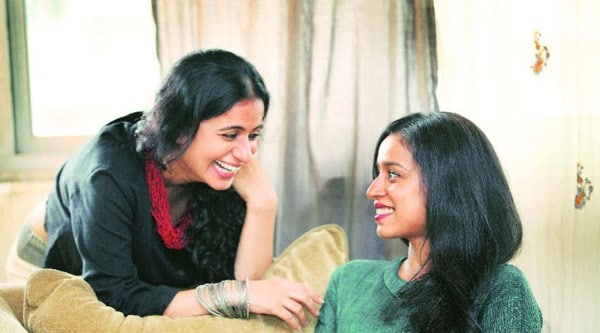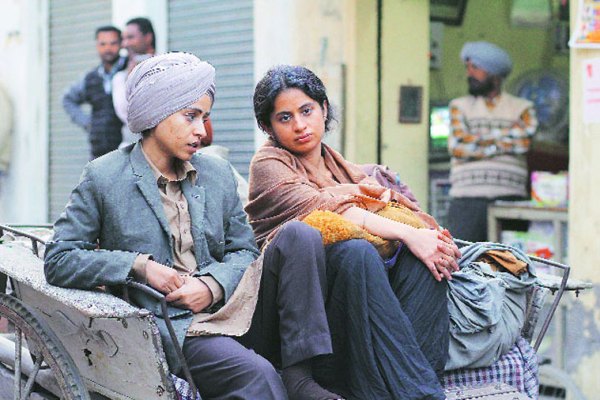Click here to follow Screen Digital on YouTube and stay updated with the latest from the world of cinema.
A Tale of Two Girls: Tillotama Shome and Rasika Dugal talk their bond and Qissa
Tillotama Shome and Rasika Dugal talk about the inexplicable bond they share on screen in Qissa, and their journey as actors.
 Lasting Friendship Rasika Dugal (left) and Tillotama Shome in Mumbai
Lasting Friendship Rasika Dugal (left) and Tillotama Shome in Mumbai
During her audition for Qissa, Tillotama Shome was asked to perform a peculiar task — knot her body by slipping her hands through her legs. At which point, director Anup Singh asked her to slowly release her hands and say, “Ma”. Shome still doesn’t know what the Geneva-based director had in mind at the time. “The relationship between Kanwar and her mother is that of constant longing. He might have wanted to see that during the audition,” says Shome.
In the film, set in the post-Partition period, she plays Kanwar, a girl raised as a boy by her father Umber Singh (Irrfan). For the film, Shome had to undergo intensive physical training, and learn Punjabi. “It was like being in Anup Singh’s school of acting,” says the 34-year-old, who won the best actor awards for Qissa at film festivals in Queensland, Australia, and Abu Dhabi.
On the other hand, Rasika Dugal, who plays Neeli, the woman Kanwar gets married to, stepped into the role days before the shoot, after the actor supposed to play Neeli dropped out. Being a Punjabi, she knew the language, but had to learn a tribal dialect as she plays a nakaal, a gypsy girl. “I had always wanted to polish my Punjabi, and explore rural Punjab,” says Dugal, 30.
 A still from the film Qissa
A still from the film Qissa
In the film, fate throws them in a strange situation. After marriage, Neeli finds out that her husband is not a man. “I was not prepared to find out that our relationship was an exploration of the sensual. How does one categorise this relationship. Are we lovers? We are not. Do we love each other? Maybe,” says Shome.
Apart from their ambiguous relationship, the film explores Umber Singh’s trauma of being displaced during Partition and his grief of not fathering a son. Shome watched a lot of Irrfan’s films to prepare for the role. “What would Kanwar do to become the son that the father wants her to be? She will imitate the father. I wanted to steal any gesture that I could to incorporate in my performance,” says Shome, who also acted in Dibakar Banerjee’s Shanghai.
Seated in Shome’s living room in Versova, Mumbai, the two actors come across as different from each other as their characters in the film. “There is an unaffected gravity in Tillotama, while there is a wide-eyed spontaneity in Rasika. Tillotama never builds a character with familiar expressions, tics or gestures. As an actress, Rasika disorients everyone,” says Singh, who has also directed The Name of a River and The Gentle Dance (Lasya).
Shome and Dugal spent considerable time with each other during the shoot. Living on the location for two months helped. “We would constantly try to find how to do certain scenes,” remembers Shome. In the course of their interactions, they developed a synergy, which made slipping into their characters easier. “Once, I asked Tillotama and Rasika to prepare for a few days to improvise a scene together. This was for the hardly two-minute song sequence, where Neeli tries to help Kanwar find her femininity again. They found unpredictable ways to reach out to each other,” recalls Singh. He regrets not having the camera on at the time.
Both Shome and Dugal are first-generation actors. Shome’s father was an army officer and Dugal’s a school principal. Shome was introduced to theatre when she was 19. While still in Lady Shri Ram College, she was recommended to Mira Nair for Monsoon Wedding, in which she played Alice, the maid who makes the wedding-organiser lovesick enough to munch marigold. She later went on to study educational theatre at New York University. She has acted in a number of projects like Florian Gallenberger’s Shadows of Time and Italo Spinelli’s Gangor.
Dugal, too, started acting at Lady Shri Ram College. The decision to go to Film and Television Institute of India (FTII), Pune, followed. In 2011, she was noticed for her performance in Kshay, an independent psychological drama by Karan Gour.
Qissa premiered last year at the Mumbai Film Festival (MFF) where it picked up the silver Gateway of India award, and is likely to be released in December. Both the actors are curious to know how the Indian audience would react to their onscreen relationship. A scene, where Shome appears partly nude has been removed from the Indian version. “Initially, I was apprehensive as I did not want that scene to become the talking point. It’s amazing how no one is talking about it,” says Shome. In the meanwhile, Dugal is busy shooting for a detective serial and a play called Bombay Talkies, while Shome is shooting for an untitled film co-starring Manoj Bajpai and enjoying the complements that Jeffrey Brown’s Sold is getting her.


































